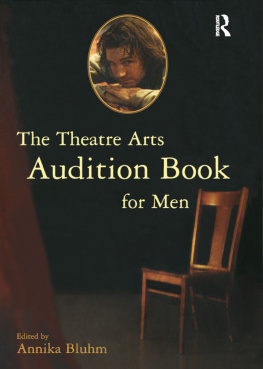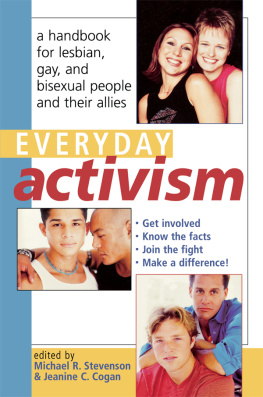Annika Bluhm - The Theatre Arts Audition Book for Men
Here you can read online Annika Bluhm - The Theatre Arts Audition Book for Men full text of the book (entire story) in english for free. Download pdf and epub, get meaning, cover and reviews about this ebook. year: 2003, publisher: Theatre Arts Books, genre: Art. Description of the work, (preface) as well as reviews are available. Best literature library LitArk.com created for fans of good reading and offers a wide selection of genres:
Romance novel
Science fiction
Adventure
Detective
Science
History
Home and family
Prose
Art
Politics
Computer
Non-fiction
Religion
Business
Children
Humor
Choose a favorite category and find really read worthwhile books. Enjoy immersion in the world of imagination, feel the emotions of the characters or learn something new for yourself, make an fascinating discovery.
- Book:The Theatre Arts Audition Book for Men
- Author:
- Publisher:Theatre Arts Books
- Genre:
- Year:2003
- Rating:4 / 5
- Favourites:Add to favourites
- Your mark:
- 80
- 1
- 2
- 3
- 4
- 5
The Theatre Arts Audition Book for Men: summary, description and annotation
We offer to read an annotation, description, summary or preface (depends on what the author of the book "The Theatre Arts Audition Book for Men" wrote himself). If you haven't found the necessary information about the book — write in the comments, we will try to find it.
The Theatre Arts Audition Book for Men — read online for free the complete book (whole text) full work
Below is the text of the book, divided by pages. System saving the place of the last page read, allows you to conveniently read the book "The Theatre Arts Audition Book for Men" online for free, without having to search again every time where you left off. Put a bookmark, and you can go to the page where you finished reading at any time.
Font size:
Interval:
Bookmark:

The Theatre Arts
Audition
Book for Men
The Theatre Arts
Audition
Book for Men
Compiled by Annika Bluhm

Published in the USA and Canada in 2003 by
Routledge
711 Third Avenue,
New York, NY 10017
Routledge is an imprint of the Taylor and Francis Group, an informa business
Copyright in this selection 2002 by Annika Bluhm
First published in Great Britain in 1989 by Methuen Drama
This revised and updated edition first published in 2003 by
Methuen Publishing Limited
These extracts are fully protected by copyright. Any enquiries concerning the rights for professional or amateur stage production, broadcasting, readings, etc. should be made to the authors agents and not to the publisher.
This book is sold subject to the condition that it shall not, by way of trade or otherwise, be lent, resold, hired out, or otherwise circulated in any form of binding or cover other than that in which it is published and without a similar condition, including this condition, being imposed on the subsequent purchaser.
Library of Congress Cataloging-in-Publication Data
The theatre arts audition book for men / complied by Annika Bluhm.
p. cm.
Theatre Arts book.
ISBN 0-87830-172-0 (alk. Paper)
1. Acting. 2. Monologues. 3. ActingAudtions. 4. Drama20th century. 5. MenDrama. I. Bluhm, Annika.
PN 2080.T47 2003
822.0450891dc21
2002036978
ISBN 13: 978-0-87830-172-0 (pbk)
Contents
by Annika Bluhm
by Jim Cartwright
by Timberlake Wertenbaker
by Elizabeth Kuti
by Michael Wilcox
by David Greig
by David Edgar
by John Retallack, adapted from the novel by Melvin Burgess
by Howard Brenton
by Stephen Poliakoff
by Edward Bond
by Terry Johnson
by Alan Ayckbourn
by Richard Cameron
by Michael Wilcox
by Robin Soans
by Manfred Karge
by Edward Bond
by Barrie Keeffe
by Edward Bond
by Ron Hutchinson
by Kevin Hood
by Max Frisch
by Philip Ridley
by Willy Russell
by Ken Bourke
by Ntozake Shange
by Iain Heggie
by Peter Whelan
by Michael West
by Caryl Churchill
by Peter Morris
by Dermot Bolger
by David Edgar and Susan Todd
by Richard Cameron
by Mtwa/Ngema/Simon
by Martin McDonagh
by Howard Brenton
by Sue Townsend
by David Mercer
by Gary Owen
by Terry Johnson
by Shelagh Stephenson
by Terry Johnson
by Howard Korder
by Nick Dear
by Shelagh Stephenson
by Deepak Verma
by John Hegley
by Simon Stephens
by Christopher Luscombe, adapted from the play and short story by Nol Coward
Thank you to Andrew, Griffin and Arden Farrow.
In the course of compiling this book I spoke to a number of directors working in various areas of theatre, from drama schools to the National Theatre. Nearly everyone agreed that an actors most important attribute was self-knowledge. Self-knowledge can be expressed in a variety of ways: through wit, intelligence, verbal and physical dexterity, an assertive, as opposed to an aggressive manner.
There is a great difference in approach to auditioning m Britain and the United States. In America cut-throat competition has engendered a highly professional attitude. Actors tend to arrive fully prepared for an audition, on time, with well-rehearsed speeches from plays that they have taken the time to read in their entirety. In contrast directors spoke about the appalling diffidence of many actors in Britain, who arrived in no way prepared, appearing to feel that the audition was something of an imposition and that performing was the last thing in the world they wanted to do.
Directors were keen to emphasize the fact that an audition is not a test but a meeting between the actor and director to assess the possibility of working together. Many felt that auditioning should be more of a two-way process and that actors should accept more power or responsibility for themselves when auditioning. In other words, actors should not be tempted to play down their own intelligence, to act according to what they think the director wants, but to see themselves as professionals.
Opinions differ as to how much an actor can show about the way he/she works in an audition. One felt that it was a genuine opportunity for an actor to display their work; another, that little could actually be revealed by the presentation of a speech auditioning being an artificial performing situation and that the actor should concentrate on presenting themselves as well as possible, on maximizing their presence. Clearly in an ideal audition one should do both. One should be clear, concise and, equally important, unpretentious. One director talked of avoiding the temptation to be arch. Another was looking for assurance with natural reticence, which she went on to explain as including the director in the audition in an open way, talking with, rather than at, him or her.
Most key points as regards the selection and presentation of the audition piece are common sense, but easy to overlook in the attempt to impress. For instance it would be unwise to attempt a speech using a particular accent unless it was well within your capabilities and it would be sensible to choose a role within your own age-range. In the event of an audition being for a specific role, select a pertinent piece: if the production is to be a comedy, present a comic speech. It should be emphasized that there is no substitute, when preparing an audition speech, for reading the play in its entirety.
Everybody acknowledged the advantages of doing a witty or comic piece mainly because they enjoyed being able to laugh. They felt that it was extremely hard for an actor to play a highly emotional scene in an audition without resorting to a good deal of tension, both physically and vocally.
How can you make auditioning a less nerve-racking affair? Most directors agreed on this. Get a good nights sleep, wear comfortable clothes, arrive early and find a quiet place to calm down and centre yourself. Above all, everyone stressed, have fun!
Some speeches are amalgamated. This is indicated by punctuation: [ ].
by Jim Cartwright
Road is an episodic play set in a street in Lancashire where unemployment and despair is rife. Throughout the play different characters reveal the state of their lives.
Skin is one of these characters. This speech is the only time Skin appears in the play. However, it is imperative to read the whole play to understand this character.
Lights come up on aYoung Mansitting on a wooden chair. A bare light bulb is dangling.
Skin Om. He opens his eyes. He sees you. He wants to tell you the story. He feels the need to drift back on the tide of his memory, back, back, back. And Im the lonely skinhead again. Jogging away, every day, to the best, to be the best. And the press-ups. And the situps. And the 1-2-3, 1-2-3, 1-2-3, 1-2-3. And youve gotta be fit to fight, and I do, every Saturday night, with my friends at weekends, fight. Do you know about fighting? No. Ill tell you in my story. And I want to be the best skinhead and I want to give everything, every single thing, to the experience of the tingle. Ill tell you about the tingle later. And youve got to be fit to fight, and practise tactics every night.
Font size:
Interval:
Bookmark:
Similar books «The Theatre Arts Audition Book for Men»
Look at similar books to The Theatre Arts Audition Book for Men. We have selected literature similar in name and meaning in the hope of providing readers with more options to find new, interesting, not yet read works.
Discussion, reviews of the book The Theatre Arts Audition Book for Men and just readers' own opinions. Leave your comments, write what you think about the work, its meaning or the main characters. Specify what exactly you liked and what you didn't like, and why you think so.




